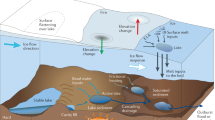Abstract
THE first of six reasons given by Sir Flinders Petrie (NATURE, Oct. 9, p. 514) for maintaining his view that the level of the Fayum lake gradually rose with the rise of the Nile, is that there must have been an open channel which it is unlikely would have become blocked when a large mass of water flowed to and fro each year. The flood waters of the Nile are heavily silt laden, and when they entered and filled the Fayum the surplus would have re-established its ordinary course northwards along the valley. The lake, connected by a channel at least 10 kilometres long, would never have filled quite to the Highest flood level of the river. As soon as the crest of the flood passed and the water levels began to fall, the current in the connecting channel would die away, silt would be deposited, and it would have become choked and blocked up. The river carries most silt at the highest levels of the flood, and the rapidity with which deposits are formed must be seen to be realised. The inlet, once closed with a bank of silt, would not have been readily reopened.
This is a preview of subscription content, access via your institution
Access options
Subscribe to this journal
Receive 51 print issues and online access
$199.00 per year
only $3.90 per issue
Buy this article
- Purchase on Springer Link
- Instant access to full article PDF
Prices may be subject to local taxes which are calculated during checkout
Similar content being viewed by others
Author information
Authors and Affiliations
Rights and permissions
About this article
Cite this article
GRABHAM, G. The Fayum Lakes. Nature 118, 911–912 (1926). https://doi.org/10.1038/118911a0
Issue Date:
DOI: https://doi.org/10.1038/118911a0
Comments
By submitting a comment you agree to abide by our Terms and Community Guidelines. If you find something abusive or that does not comply with our terms or guidelines please flag it as inappropriate.



